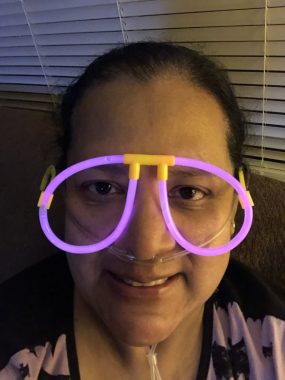After All These Years, I Have Learned to Love My Imperfections
Written by |

How do you learn to love your body while struggling with a rare illness? I used to ask myself this almost daily.
I love to eat, and comfort food provides just that — comfort. Vegetables and fruits sound delicious, but they wouldn’t be the first thing I run to at a buffet.
I loved being active when I was in high school, but I was much younger, and my endurance was out of this world. It’s different now that I am competing with a rare illness. To make things more difficult, I just don’t find exercising all that fun.
Still, I push myself to exercise and eat well. Keeping myself physically and mentally healthy is part of my treatment, though it’s not easy.
After having my daughter at 17, my physical and mental health went through some changes.
I noticed that my body didn’t magically bounce back like it used to. I became discouraged with how my body looked and gave up on my desire to be healthy, both physically and mentally.
When I looked at myself in the mirror, I saw someone who was “fat.” I stopped wearing makeup and fixing my hair, which I’d just put in a ponytail. I didn’t believe the person staring back at me deserved to look good. I started to shop in the men’s section to find clothes that would hide my body.
At family gatherings, I would liven up the party by being funny and silly, in the hopes that no one would pay attention to how “fat” I was.
I began to eat my way through depression, which caused me to reach my highest weight of 300 pounds. I took all the mirrors down, not wanting to see how I had let myself get to that point.
While struggling with my weight, self-esteem, and self-image, I started to notice the first symptoms of my illness, which gave me another reason to go deeper into my hiding hole.
After my diagnosis of lymphocytic interstitial pneumonia, I became even more discouraged about my body. I knew my unhealthy weight could make things worse.
My pulmonologist kept weighing in (no pun intended) on my body mass index (BMI). He reminded me that my weight would be a factor in my eligibility for a lung transplant. This pressure brought my anxiety to new heights.
I was given several options. I could go to a treatment facility for severe obesity, or I could have weight-loss surgery to rapidly reach my projected BMI.
These discussions made me feel more disgusted with myself. I felt like others saw me as a poor soul who couldn’t control her eating habits. I felt like a failure.
I knew something had to be done. I needed the will to overcome my bout of depression, so I decided to see a counselor about my mental health.
After a while, I started to see myself in a different light — as worthy. I began to love my body the way it is because this body held and nourished a beautiful life. How could I hate my body when it created life?
I learned a lot about myself. I learned why I was beating myself up about my body. I learned that becoming a mother at a young age came with challenges. I learned it’s OK to own my body.
I began to realize that this is my journey. I choose how my journey maps out.

(Photo by Ann Reynoso)
I now counsel with a nutritionist, exercise, and eat well. Though I have cheat days, I work hard at staying on track. I still have a ways to go to reach the BMI that is required for a transplant, but even when I do, I will continue to keep myself physically and mentally healthy.
My depression is now a part of my past. I allow myself to be imperfect and I like it. It makes me unique. I am just Ann. A mother, a wife, and a rare illness fighter. I love my body. I feel beautiful and I have come to love the woman I see in the mirror.
***
Note: Pulmonary Fibrosis News is strictly a news and information website about the disease. It does not provide medical advice, diagnosis, or treatment. This content is not intended to be a substitute for professional medical advice, diagnosis, or treatment. Always seek the advice of your physician or other qualified health provider with any questions you may have regarding a medical condition. Never disregard professional medical advice or delay in seeking it because of something you have read on this website. The opinions expressed in this column are not those of Pulmonary Fibrosis News or its parent company, Bionews, and are intended to spark discussion about issues pertaining to pulmonary fibrosis.



Joanne
I have IPF diagnosed 2018. I was put forward for lung transplant Sept 2020 but weighed 104kg I was told to loose weight 6months on I'm 67kg and have just made it to the lung transplant list, my lung capacity is 38% now, I have come along way to get here but made up I am, it wasn't easy some dark days of depression lost all my muscle tone but with the help of the physio team an family an friends I am in a good place now.
Ann Reynoso
Hi Joanne, thank you for sharing your story. I completely understand how hard it can be to deal with this disease and have to keep up with being healthy both physically and mentally. I am so happy to hear you are in a good place. It is very important to have a strong and loving support team. Stay strong!
Mark Lunt
I have been diagnosed with IPF and have become resigned to the fact that I will die early. I have not been told about lung transplantation and feel as though I am just biding my time slowly getting worse. I Try to be upbeat for my beautiful family but am finding it getting harder. When I try to research the disease I just don't know where to start.
Ann Reynoso
Hi Mark, thank you for sharing your concerns. When I was first diagnosed, I too, did not know where to begin. I tried looking for medical journals that could give me some glimpse of knowledge and hope. Unfortunately, my disease is rare and there wasn't enough information to satisfy my need to know more. I took it upon myself to become my own advocate and decided to keep a journal of my daily living. This way I could write down every symptom, pain, oxygen levels, lack of energy, and what I could eat or not. This journal is what I take with me every time I see my pulmonologist. To be fair, I have had to change pulmonologist several times before I finally found one that fit my needs and concerns. I have also joined organizations pertaining to pulmonary fibrosis on social media. I have particularly found one on Facebook that has been such a great healing for me. It is always nice to meet others who have the same disease so that you can share your stories and struggles. Another thing that I have done is get all my affairs in order so that I know when my times comes, my family is taken care of and they will not have to worry about anything. I too think about my time left. Stay positive and know that although we may have a time limit, we still have some time to enjoy what we have, which is our loved one and friends. Remember, talking to your doctor is always best. There is no one better equipped to help answer all your concerns. It is your right to find a doctor that best suits you. May your days be joyful and fulfilling.